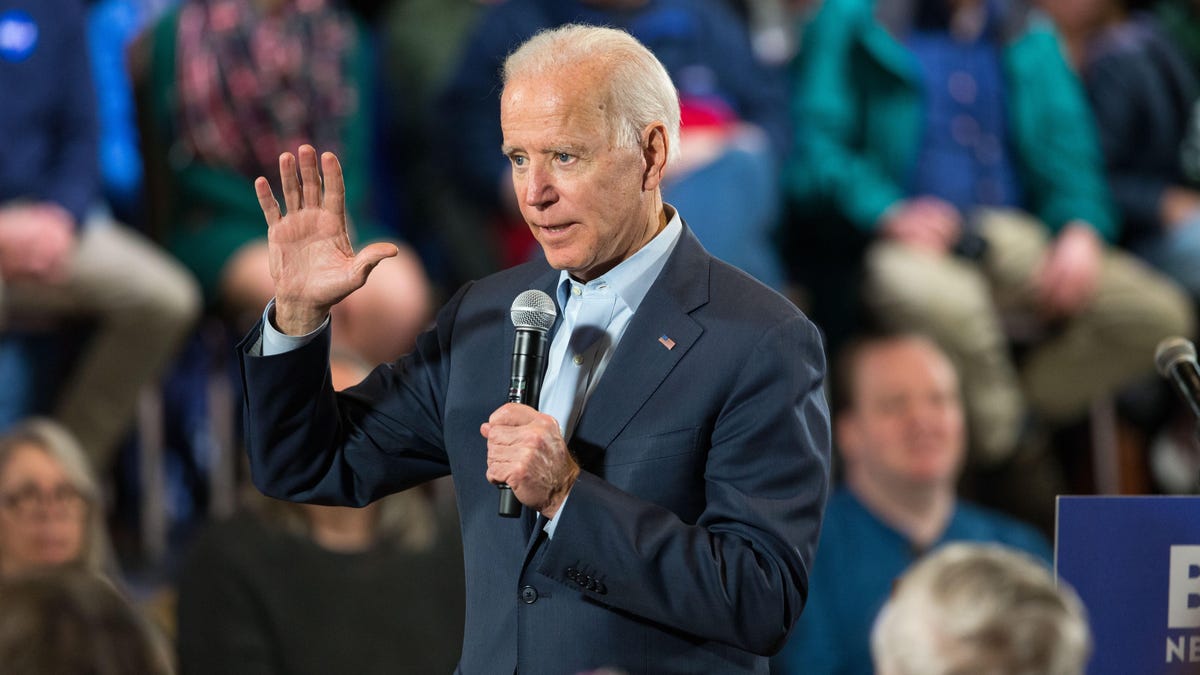Misleading video of Joe Biden is another test for Twitter, Facebook and YouTube
Think before you share on social media.

Democratic presidential candidate and former Vice President Joe Biden speaks during a campaign Town Hall on Dec. 30 in Derry, New Hampshire.
A selectively edited video of Democratic presidential candidate Joe Biden that falsely suggests he's making racist remarks went viral on Twitter this week, highlighting another big challenge for social media companies ahead of the 2020 US elections.
The US intelligence community and lawmakers have raised concerns about manipulated videos and "deepfakes," a technique that uses AI to create videos of people doing or saying something they didn't. The Biden video isn't a deepfake, but it shows how easy it is to mislead others about what what someone is saying. It's also another reminder that social media users should be wary about content they swiftly share with a push of a button.
The nearly 20-second Biden video, which garnered more than a million views on Twitter and also spread on Facebook and Google-owned YouTube , came from a longer ABC News video of Biden speaking for more than an hour in Derry, New Hampshire, on Monday. In the ABC News video, which CNET viewed, Biden is responding to a question about his work around sexual assault and domestic violence. But the anonymous Twitter user who posted a clip from the ABC News footage shared a shorter version of Biden's remarks without any initial context about the topic the presidential candidate was discussing.
"...the culture. Our culture, our culture, it's not imported from some African nation or some Asian nation. It is our English jurisprudential culture," Biden said in the video clip on Twitter. The tweet that accompanied the video read "Biden proclaims the 'European' identity of America: 'Our culture is not imported from some African nation.' "
Twitter users, some with thousands of followers, commented that Biden was part of the alt-right and racist. Other users pointed out the clip cut off part of Biden's sentence and left out important context.
In the original video, Biden said "Folks, this is about changing the culture, our culture, our culture. It's not imported from some African nation or some Asian nation. It's our English jurisprudential culture, our European culture, that says it's all right."
A Twitter spokeswoman on Thursday said the tweet that included the Biden video didn't violate the company's rules. The company is working on a new policy to address manipulated video, although it's unclear if it would apply to this type of video. Twitter said it defines manipulated media as "any photo, audio, or video that has been significantly altered or fabricated in a way that intends to mislead people or changes its original meaning."
Biden's campaign didn't have a statement about the video. The Twitter user who posted it said in a direct message that the video was part of "a humorous thread of out-of-context Biden gaffes and verbal stumbles." Users also don't want to watch longer videos, the user said. "It's not up to me how people want to interpret them," the user said in the direct message.
Facebook and YouTube didn't reply to questions about how they were approaching this type of video.
Social media companies have different approaches to misleading videos. In May, videos of House Speaker Nancy Pelosi were doctored to make it seem as if she was slurring her words. YouTube, which has a policy against "deceptive practices," took down the Pelosi video. Facebook showed information from fact-checkers and reduced the spread of the video, although it acknowledged it could have acted more swiftly. Twitter didn't pull down the Pelosi video either.
Social media companies are also grappling with deceptive videos in political ads. In October, Biden's presidential campaign asked Facebook to remove an ad by Donald Trump's reelection campaign because it contained misinformation about the former vice president. Facebook rejected that request, noting it doesn't send speech from politicians to third-party fact checkers. The Trump's campaign ad on Facebook included a 30-second video that stated Biden had promised Ukraine $1 billion if officials in that country fired the prosecutor investigating a company affiliated with Biden's son. There's no evidence to support the claim, which has been debunked by fact-checking groups and media reports.
Originally published Jan. 2.
Update, Jan. 4: Includes comment from anonymous Twitter user who posted the video.

